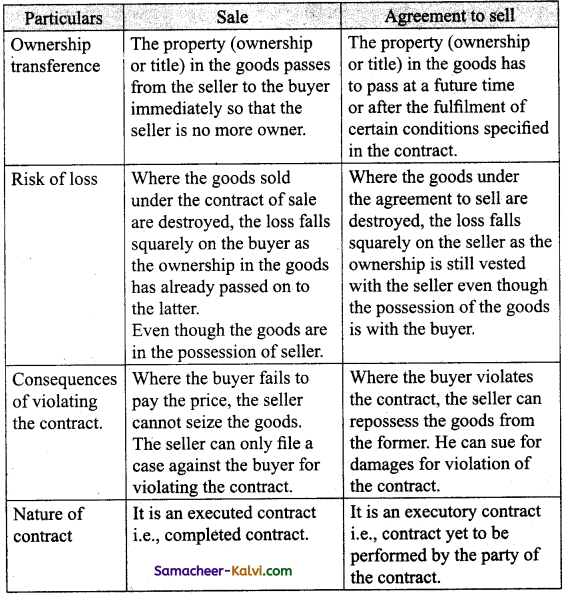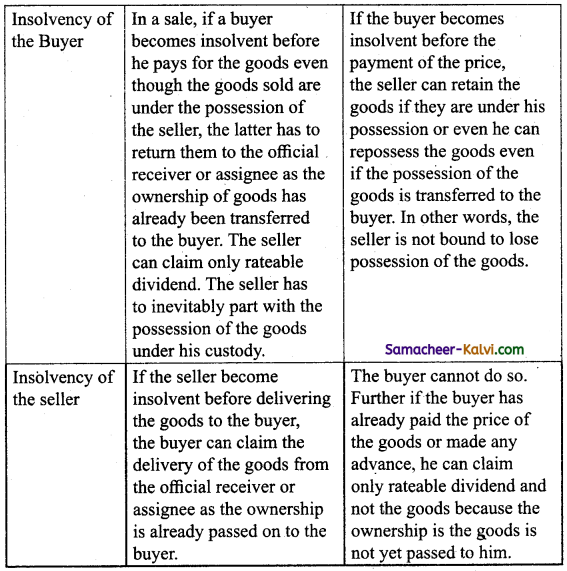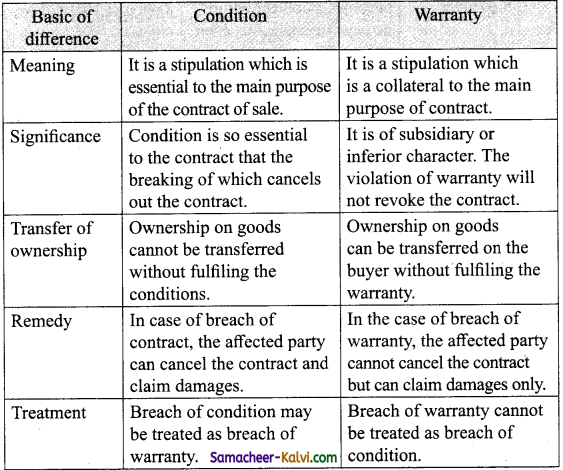Samacheer Kalvi 12th Commerce Notes Chapter 21 The Sale of Goods Act, 1930
→ Sale of goods is one of the most important act under special contract. This act was passed in the year 1930. Contracts for the sale of goods are subjected to general legal principles applicable to all contracts.
→ Contract of sale of goods is a contract whereby the seller transfers or agrees to transfer the property (ownership) of the goods to the buyer for a price. The term “ownership” is utmost importance in the sale of goods.
→ The elements are necessary for a contract of sale. Two parties, transfer of property, goods, price includes both sale and “agreement to sell”.
→ The term goods means every kind of movable property other than actionable claim and money. The term goods includes shares, stocks, growing crops, grass things attached to the land or farming part of the land agreed to be cut off from the land before sale.
→ The type of goods covered under the sale of goods act. Existing goods, contingent goods and future goods.
→ Transfer of property (ownership) in goods from the seller to the buyer is the main object of a contract of sale.
→ Condition is a stipulation which is essential to the main purpose of the contract of sale. Warranty is a stipulation which is collateral to the main purpose of contract.
→ A seller is deemed to be an unpaid seller
(a) When the whole of the price has not been paid or
(b) A bill of exchange or other negotiable instrument given to him has been dishonoured. Seller includes not only the actual seller but also an agent of a seller or a consignee.
(i) X purchased a hot water bottle from Y, retail chemist. X asked Y if it would stand boiling water. The chemist told him that the bottle was meant to hold hot water. The bottle burst when water was poured into it and injured his wife. State whether seller is liable for the injury suffered by the buyer and the consequent compensation, give your reasons.
The seller is not responsible for the injury because he already informed that the bottle is hot water bottle X’s wife poured boiled water in the bottle. So she was injured. So there is no need for compensation.
(ii) X asked a car dealer to suggest him car suitable for touring purposes. The dealer suggested a ‘Buggati Car’. Accordingly, X purchased it but found it unsuitable for touring purpose. State whether the car dealer is liable for breach of condition?
Yes, car dealer is responsible for breach of condition because he told “Buggati car” is suitable for touring purpose not for usage.
(iii) X, a dealer sold a plastic catapult to B. While using the catapult in the usual manner, it broke due to the fact that the materials used in its manufacture were unsuitable. As a result,the boy who was using it, blinded in one of his eyes. State whether the seller is liable or not.
The seller is liable. The materials used to manufacture catapult it is not a good quality. So that the boy was blinded in one of his eyes.
(iv) X bought from Y a heap of wheat the weight of which is 1000 kg at the rate of ₹ 8 per kg. and agrees to pay the price on the first day of the next month and the wheat is to be delivered at X’s godown on the following day. A fire broke out and the entire quantity of wheat was destroyed. State whether X is liable to pay the price or not. Why?
X is not liable, before the deliver of the goods were destroyed in Y’s go down. So it is not necessary for X to pay the price.
(v) X bought from Y a heap of wheat (weight 100 kg) at the rate of Rs. 8 per kg. and Y had to put the wheat in bags to deliver it to X. Y filled some bags in X’s presence, but before the remainder could be filled, a fire broke out and the entire quantity of wheat was destroyed. State whether X is liable to pay the price or not. Why?
X is not liable. The reason is non- delivery of the goods by Y. Before fill the wheat in bags, the godown caught fire. So it is not necessary for X to pay the price.
(vi) X bought from Y a heap of wheat at a rate of ? 8 per kg and Y had to weigh the wheat. Before weighing was completed, the wheat was destroyed by fire. State whether X is liable to pay the price or not. Why?
Clues: Students are advised to read thoroughly the implied warranties and conditions for the cases 1 to 3 and rules relating to transfer of ownership for cases 4 to 6.
X is not liable. Before weighing the wheat, the wheat was destroyed by fire. So it is not necessary for X to pay the price.
(a) Find out whether the following transactions can be included under the Contract of Sale:
(i) X agreed to sell 100 shares to Y for ? 10,000.
Contract of sale.
(ii) X agreed to sell his building for ? 1,00,000 to Y.
No
(iii) X agreed to exchange with Y 100 kg of rice valued at Rs. 20 per kg for 200 Kg of wheat valued at ? 12 per kg. and pay the difference in cash.
Contract of sale.
(iv) X agreed to transfer some jewellery to his prospective wife out of love and affection.
No
(v) X agree to buy a painting from an artist
Contract of sale.
(vi) X supplied a piece of cloth to a tailor to stitch a suit for him. The tailor agreed to supply lining materials and buttons.
No
(vii) X agreed to pledge his goods valued at ? 1,00,000 with Y Clues: Students are advised to understand the meaning for goods and the essential elements of contract of sale.
No
(b) Find out whether the following contracts of sale amount to sale or agreement to sell:
(i) X entered into a contract for sale entire crop of rice cultivated in his farm.
Agreement to sell
(ii) A railway administration agreed to sell coal-ash that might accumulated during the period of the contract.
Agreement to sell
(iii) X entered into a contract for sale of some goods in a particular ship to be delivered on the arrival of the ship.
No
(iv) X entered, into a contract for sale of a painting only if Z, its present owner sells it to him.
Agreement to sell
(c) State whether the seller is an unpaid seller or not in the following cases:
(i) X sold some goods to Y for ₹ 10,000. Y paid? 9,900 but failed to pay the balance.
Unpaid seller
(ii) X sold some goods to Y for ₹ 10,000 and received a cheque for the full price as conditional payment. On presentment, the cheque was dishonoured by the bank.
Unpaid seller
(iii) X sold some goods to Y for ₹ 10,000 on a credit of one month. One month has not yet expired.
No
(iv) X sold some goods to Y for ₹ 10,000 on a credit of one month and one month has expired and the price remains unpaid.
Unpaid seller
(v) X sold some goods to Y for ₹ 10,000 on a credit of one month. Y became insolvent during the period of credit.
Unpaid seller


